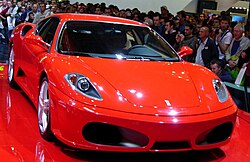Difference between revisions of "Ferrari F430"
(No difference)
|
Revision as of 19:40, 15 March 2006

| |
| Ferrari F430 | |
|---|---|
| Manufacturer: | Ferrari |
| Class: | mid-engined coupe |
| Production: | 2005 — present |
| Predecessor: | Ferrari 360 |
| Body Styles: | Berlinetta Spider |
| Engines: | 4.3 L V8 |
| This article is part of the automobile series. | |
The Ferrari F430 is a sports car automobile, the replacement for the Ferrari 360. It debuted at the September, 2004 Paris Motor Show. European left-hand drive sales began in November, 2004, but right-hand drive sales did not start until Spring 2005, and the United States did not get the F430 until the Summer of 2005.
The F430's chassis is heavily based on its predecessor, the 360. Internally, both cars are referred to with the same number (131), though the F430 has the Evoluzione tag attached to show that it features some major changes. Internally, the car is simply known as the "Evo".
The body has been redesigned to be more curvaceous and aerodynamic. Although the drag coefficient remains the same, downforce has been greatly enhanced. A great deal of Ferrari heritage is found in the car: At the rear, the Enzo's tail lights have been added, and that car's interior vents have been added to the F430 as well. The car's name has been etched into the outside of the Testarossa-styled driver's side mirror as was previously done with the F40. The large oval openings in the front bumper are remeniscent of Ferrari racing models from the 1960s, specifically the "sharknose" Formula One and 250 TR61 Le Mans cars of Phil Hill.
Along with a restyled body, the F430 features a 4.3 L V8 engine derived from a shared Ferrari/Maserati design. This new powerplant is a significant departure for the F430's line: The engines of all previous V8 Ferraris were descendents of the "Dino" racing program of the 1950s. This 50 year development cycle comes to an end with the entirely new 4.3 L, the architecture of which will later replace the Dino-derived V12 in most other Ferrari cars. Power is expected to be 360.4 kW (490 hp ) and torque 465 Nm (343 ft.lbf). On the BBC Top Gear programme, shown on the 17 July 2005, the Stig achieved a Power Lap time of 1.22.9 which was slower than the Ferrari 360 Challenge Stradale at 1.22.3 due to the F430's Bridgestone Tyres being slower than the F360CS'Pirellis. The F430 costs £118,000.
Other notable features include the first application of Ferrari's manettino steering wheel-mounted control knob. Drivers can select from five different settings with modify the vehicle's "Skyhook" electronic suspension, transmission behavior, throttle response, and active "E-Diff" differential. The feature is similar to Land Rover's "Terrain Response" system.
The E-Diff is another important addition. It is a computer-controlled limited slip differential which can vary the distribution of torque based on inputs such as steering angle and lateral acceleration.
Car and Driver found the car's performance worthy of the Ferrari heritage, and recorded a 3.5 sec 0-60 mph acceleration run in the F430. This makes it the second-quickest Ferrari road car ever made, after the Enzo. That being said, the 3.5 second 0-60 run was made on a European spec car, which has launch control, a feature designed to help launch the car from a standing start at high RPM's. Much like the E-Diff and the manettino, the launch control is a technology borrowed from Ferrari's legendary Formula 1 racing program. The launch control is unavailable in U.S.-spec F430's, presumably due to liability issues.
When Car and Driver tested a U.S.-spec F430, they recorded a 0-60 time of 4 seconds- a figure still worthy of the Ferrari name.
The F430 is also the cover car for the video game Project Gotham Racing 3.
External links
- Ferrari F430 High Resolution Images
- Ferrari F430 Spider High Resolution Images
- www.ferrariworld.com
- AutoGuideWiki.com
- Car and Driver's test of the U.S. spec F430
- Car and Driver's test of the Euro-spec F430
| < Ferrari timeline 1948–1967 | Ferrari timeline 1960s-1990s | Ferrari timeline 1990–Present > | |||||||||||||||||||||||||||||||||||||||
| Type | 1960s | 1970s | 1980s | 1990s | |||||||||||||||||||||||||||||||||||||
| 0 | 1 | 2 | 3 | 4 | 5 | 6 | 7 | 8 | 9 | 0 | 1 | 2 | 3 | 4 | 5 | 6 | 7 | 8 | 9 | 0 | 1 | 2 | 3 | 4 | 5 | 6 | 7 | 8 | 9 | 0 | 1 | 2 | 3 | 4 | 5 | 6 | 7 | 8 | 9 | ||
| 8 cylinder | Mid-engine berlinetta | 308 | 308 i | 308 QV | 328 | 348 | 360 | ||||||||||||||||||||||||||||||||||
| 208 | 208 Turbo | GTB/GTS Turbo | F355 | ||||||||||||||||||||||||||||||||||||||
| Mid-engine 2+2 | 308 GT4 | Mondial 8 | Mondial QV | Mondial 3.2 | Mondial t | ||||||||||||||||||||||||||||||||||||
| 208 GT4 | |||||||||||||||||||||||||||||||||||||||||
| 12 cylinder | Boxer berlinetta | 365 BB | 512 BB | 512i BB | Testarossa | 512TR | F512M | ||||||||||||||||||||||||||||||||||
| Grand tourer | 250 | 275 | 365 GTB/4 "Daytona" |
550 Maranello | |||||||||||||||||||||||||||||||||||||
| America | 330 | 365 | |||||||||||||||||||||||||||||||||||||||
| 2+2 coupé | 250 GT/E | 330 GT 2+2 | 365 GT 2+2 | 365GTC/4 | GT4 2+2 | 400 | 400 i | 412 | 456 | 456 M | |||||||||||||||||||||||||||||||
| Supercar | 250 GTO | 250 LM | 288 GTO |
F40 | F50 | ||||||||||||||||||||||||||||||||||||
| Sold under the Dino marque until 1976; see also Ferrari Dino | |||||||||||||||||||||||||||||||||||||||||